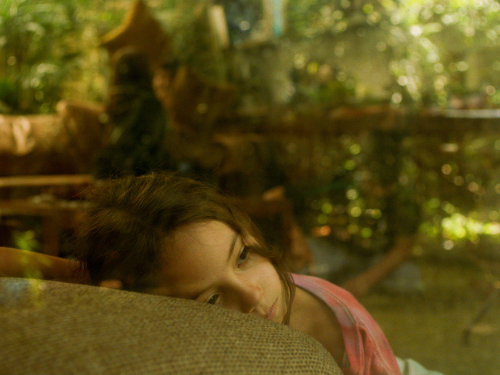
Limerencia
MOVIE REVIEW
Tótem (2023)
There's a birthday to celebrate, so sisters Nuria (Monserrat Marañon) and Ale (Marisol Gasé) have a big day of preparations ahead. The party is in their large family home in Mexico City, with Nuria's little daughter, Esther (Saori Gurza), and their niece Sol (Naíma Sentíes, who radiates a knowingness unusual in a little kid) underfoot. Their father, Roberto (Alberto Amador), who speaks with a voicebox, is still seeing his therapy patients in his studio as usual, which hardly helps. Sol's mother, Lucía (Iazua Larios), has had to go to work but she’ll be back for the party, which is for Sol's dad, the sisters’ sweet artist brother, Tona (Mateo García Elizondo). He is barely in his 30s, and lives in a slightly separate, quieter part of the house, but no one will allow Sol back in there to see him. He needs to rest before the big occasion. After all, this is his last birthday.
Writer-director Lila Avilés has made a masterpiece about how a noisy, bustling family insists life will triumph over death if they have anything to do about it. The film's unusual frankness about the body – Tona, who has terminal cancer, physically needs his carer, Cruz (Teresita Sánchez), more than he is happy to admit – is necessary when dealing with such a fraught topic. It also contextualizes the opening scene of Sol and Lucía in a public toilet, where Sol takes so long on the potty (while wearing a clown wig, which is important later) Lucía can’t hold it any longer and has to go in the sink. We might as well get used to dealing with it all head-on, Ms. Avilés is telling us. Ale dyes her hair in the kitchen sink, over the dishes; and Sol brings in snails from the garden to decorate the pictures on the walls. When Nuria uses her anticellulite machine Esther handles the controls, which is obviously hilarious. Ale arranges for a spiritualist to purify the house; she makes a tornado’s worth of fuss before renegotiating her agreed-upon fee. Ale’s teenage children want to play video games instead of helping with the cleaning, which requires a big debate about sexism. There’s a “Starry Night”-themed cake to bake and decorate. Sol and Esther find their grandfather’s voicebox and start playing with it. You get the idea.
Sol is such a sad little girl, which the adults respect and worry about. They try to ensure she's fully included so as not to drown in her sadness. But sometimes they also leave her alone so she can climb up some shelves in a storage room and read about the universe on a mobile phone she’s borrowed. And the food needs to be prepared. And the sisters – there’s a brother, Napo (Juan Francisco Maldonado), in here somewhere too – argue about what argument they could possibly make that would convince Tona to restart chemotherapy. Will the quantum prayers buy him more time? Will Nuria’s shaved head make him think it might not be so bad? Will all this absolutely overwhelming love convince Tona to try to stay a little longer?
The sad truth is Tona is in too much pain for much more of this to be bearable, but Cruz and Sol are the only people who seem to understand. Their open-hearted love and care for him, which he reciprocates, feels like a miracle. And what’s miraculous about the production is how we never lose track of anyone during all this fuss. Thanks to Omar Guzmán’s editing we’re always clear where everyone is in the house, how much time has passed, what the crisis of the moment is and how the mood between the different members of the family is shifting even as day draws to night and the guests start to arrive. It feels like it was shot on location, and cinematographer Diego Tenorio makes full use of the space, enabling the house to feel spacious and cosy even as it swarms with people or Esther has a wobble. There’s also a really good balance between the peaceable moments of contemplation for what Tona or Sol are going through, and the more raucous periods of squabbling or dancing or the self-sabotaging therapy patient crying in disgust at her own choices. The big finale is Sol and Lucía’s birthday present for Tona, in which the clown wig plays an essential part, and of which the pathos is so palpable it’s extraordinary. Very few of the other movies in competition at the Berlinale came this close to raw feeling. It’s a terrible cliché to say this is bursting with life, but it’s unusual to see a movie so confidently, and competently, embrace chaos to make its own point: a joyous, sorrowful, defiant embrace of life in all its beautiful horror. What a dandelion of a film.
Comments